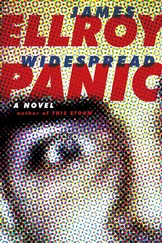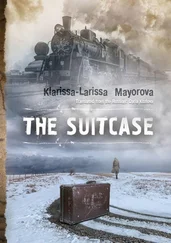A heavy object dropped onto Pasha’s shoulder — Renata’s head. It wiggled until his arm unglued from the side of his body, became a cradle. Pasha’s armpit announced, The sky is the underside of an old mattress with a monstrously obese owner who never gets out of bed.
Pasha, inexplicably overcome with tenderness, kissed the top of her head.
The sky is a turtle’s turd, said Bozhko.
The skinny-dipping was Sofya’s idea. It was turning out to be her night. Only her husband, Efim, hesitated. He was useful to the crowd in that he provided the brakes. Fishman, occasionally Ostraya and Sofya, constituted the engine, and everybody else gave color to the ride. If you just looked at Fishman, you’d never suspect the frenzy of sexual energy within him, the need that could never be satisfied for long. He looked extraordinarily plain and middle-aged: beady eyes, a nose like a nose, no lips. The face was very red, overheated, which was the only sign that beneath the surface was a barely contained fire that had settled into the most unlikely candidate. Fishman was engaged in a never-ending battle with his own odd physical manifestation, but he had it in him to fight fifty battles at once and simultaneously charm the ladies, because if he wasn’t doing that, what was the point of any of it? Along the way he charmed Pasha, who usually had a hard time tolerating the energetic types. But Fishman was less like an overgrown child, the way the majority of these types came off, more like a man in the thick of existence, encompassing all inlaid hypocrisies, chauvinisms, victories, fetishes, guilt.
After experiencing the ocean’s cool, slimy touch on every part of their bodies, they returned to the blanket. Only after falling down upon it and releasing a bit of a middle-aged sigh that betrayed the extent of their previous exertion and their joy at the support of the hard sand allowing their lower backs to release, did they find that their party was greatly diminished. Two were missing. There were whispers. Efim looked around with a dull gaze of incomprehension, then alarm. Where’s my wife — she drowned? That would’ve been nice. Neither was Fishman’s labored breathing to be heard among the pack. Two interlocked shadows disturbed the equanimity of the water, luckily out of the moonlight’s path. Occasionally Sofya’s hair caught it. Everybody on the sand felt insufficient somehow, so they had a conversation about literature, digging small holes with unconscious effort.
None of it affected Pasha too deeply. He was the observer, the anthropologist, not them. They, in fact, had it all wrong. But in this role Pasha missed a few nuances. He left with the impression that the night had been a success, whereas they might’ve been more reserved in their evaluations.
Regardless, the night served its function, casually reminding Pasha of America’s positive attributes. Immigrating wouldn’t be so bad, now, would it? He had friends. They were lively and witty. And they were somehow not overly discouraged by the predicament of writing in a different language from the one spoken on the street, perhaps because the language most seldom spoken was English. His family was here. And who knows, maybe Sanya would make a lot of money and support them — he had done that thing with the batteries. The situation in Odessa, meanwhile, was only getting worse. A systematic deterioration defined every arena of life: Pasha’s beloved bookstore had overnight transformed into a casino whose metallic windows reflected his confounded face; the only other poet he tolerated in the entire city had frozen to death last March in a drunken stupor outside the doors of another casino; those coffee-flavored sucking candies had disappeared from markets, and in a way they had been his sole joy.
Back at the apartment, the stench of vomit clung to the air. Pasha found all the lights turned on, needlessly overlapping, imparting an aggressive sheen, while everyone had fallen asleep strewn about the rooms. Robert sat at the kitchen table clutching the handle of a cup of tepid tea, his large head wedged into the crook of his elbow. Marina was slumped on the toilet seat, an anatomy textbook in her lap, forehead resting on the sink bowl. Frida lay in soapy bathwater, chin hooked on tub’s edge. Levik had been tinkering with the TV’s wiring when he’d dozed off. Esther still clung to the plastic tub, recently emptied and glistening wetly, which was settled on the summit of her stomach. Pasha set it aside and laid his head there instead. Nothing moved. Everything was perfectly, peacefully still.
The funeral was held in a massive Soviet-immigrant death establishment on Coney Island Avenue, a street where cars had many lanes but still bunched together and tiny people on the tiny strips of sidewalk seemed to be crossing a desert.
EMBARKING ON the Coney Island — bound Q, Marina spotted an inch of bench and reverse-parked herself into it. Was there a greater victory? Pregnant lady looked sturdy, Park Slopey — she’d be getting off soon anyway. Secured in this cradle of human warmth, rocked back and forth, soothed by a lullaby of rails. Too quick to rejoice — at DeKalb Avenue eyes were locked, pupils zapping. No escape. Marina summoned emergency energy reserves, reserves tapped daily and for the most part depleted. Acquaintance swooped in, hovering, head dangling from armpit. This woman, who, to be honest, Marina couldn’t place — which former life should be referenced? — began to rave about some novel she’d just finished reading: epic, absorbing, deeply evocative. Permission to tune out. Marina nodded along, studying the woman’s chiseled jaw, single chin, teeth aligned in neat rows, until her neck cramped and she looked down. Snakeskin boots, brass buckle, pointy toe, collided head-on with her own pair of subway-rat-gray Reeboks discounted from Loehmann’s, a half size too large, extra wiggle room for her toes, hallelujah! A few stops later, the train-evacuating stampede left Marina alone, holding a book. If she hadn’t been at the limits of exhaustion, she never would’ve accepted something that locked her into future interactions with whoever this acquaintance was, clearly someone liable to get carried away in the after-work delirium and make grand gestures soon to be regretted; just wait and see, in a week or two there’d be a phone call, unknown number, this friend of hers wanting the book back or at least feeling entitled to Marina’s thoughts, to a meaningful exchange of ideas and opinions.
She’d put off cracking the spine for a long time. In the first place, she resented the imposition on her life. No one knew what she was going through. No one had been through anything like it. In the second place — the cover! A blurry reproduction of a drawing depicting some dim medieval scene alerted her to the likelihood that the novel was historical fiction, a genre she avoided like the plague. Finally there was the size of the thing. It’ll build my biceps, she joked. Precisely how long it was, she still didn’t know. In the beginning she’d figured that knowing the exact number of pages would daunt and discourage, and now she feared the arrival of the end. Her mother used to say that after a certain age all a woman needs is a good book, a statement Marina found too preposterous to require rebuttal. But… The novel was written in a lucid style (so said a back-flap blurb — she agreed) and thus far had been set in seventeenth-century America (witch trials), at the turn of the twentieth century in northern China (Boxer Rebellion), and in present-day Zurich and Moscow (life). Marina couldn’t remember the last time she’d been so drawn in, so quick to lose track of the hours.
Interruptions came regularly. Marina’s childhood friend called from Tel Aviv to complain about her situation, which had a habit of hitting rock bottom, then getting drastically worse; it began to pour, and the windowsills had to be lined with towels, a plastic tub put in the corridor under the leak; Levik cut his finger making Biff Stroganoff for the guests about to arrive any minute now; the electricity went out during the October heat wave and waited to return until the last item in their fridge had perished; the cat’s vomit had to be cleaned; the cat’s diarrhea; Robert lost his hearing and began listening to Shostakovich’s string quartets at such a pitch the walls shook and reading became impossible, and Marina could only lie on the bed staring up at the ceiling in urgent need of a paint job until she either fell asleep or surrendered utterly to the fury of Shostakovich, the despair, the doom, the colossal force, which happened once. When she began driving to work instead of taking the subway, having started a new job in the cardiac unit at Methodist Hospital, the change made her put the book down for months, and when she picked it up again one evening (the evening she finally tossed the heap of junk mail and found it hiding underneath), she got a pounding brain-on-the-brink-of-explosion headache, so she took two Advil and half of her father’s yellow pill and fell into a dreamless sleep. The same thing happened a few evenings later. Every attempt brought on the same damn headache. A protracted visit to the doctor resulted in eyeglasses. For a while she avoided the book in order to avoid the glasses, or more precisely the feeling that somehow, without realizing quite when, she’d become a middle-aged hag with bad vision and achy joints and a host of other stereotypical-for-her-age issues not necessary to mention (she was still a lady after all). Eventually, however, she grew accustomed to the glasses and even began to enjoy the gesture of slipping them onto her nose, notifying her body that it was about to be returned to the realm where it felt happiest, which, oddly enough, was currently in the nineteenth century, at a monastery on a hillside in France.
Читать дальше












